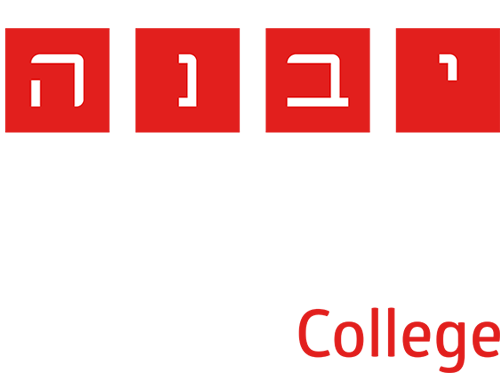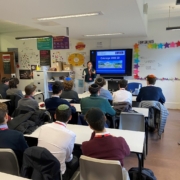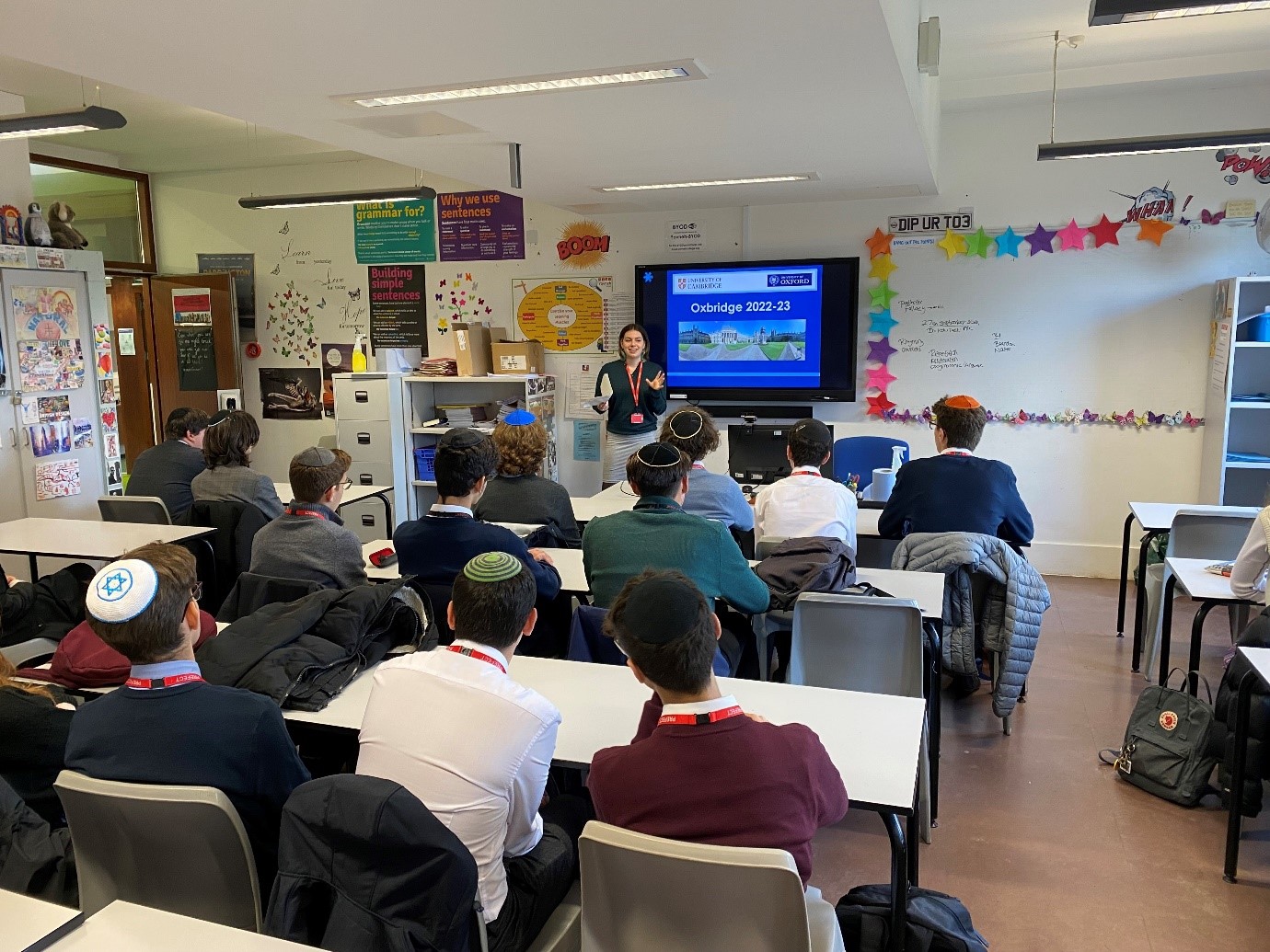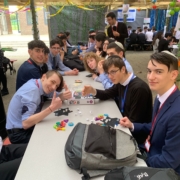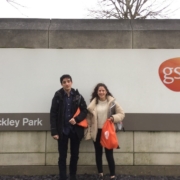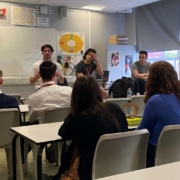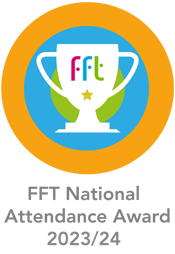My Amazing Week at GSK!
by Jessie Hakkak
The week was very different to how I expected. For example, I thought I would be walking in a huge group around a factory-like environment almost shadowing workers while in the process of making drugs. Instead, it was a more intimate setting where GSK staff told us about their experiences and individual journeys, as well as outlining the principles of the journey of a drug from research and production to market. I believe that this was a superior way of running the programme because it was more educational and I have applied my new knowledge to my A level subjects (Biology, Chemistry and Maths).
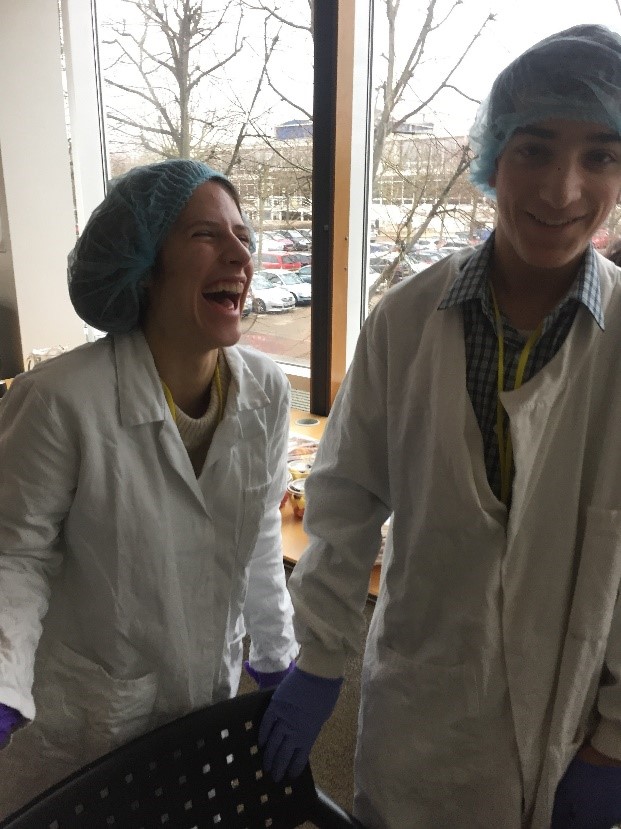
Having fun during the laboratory activity with Joel Shamash who was also accepted onto the GSK Programme
On the first day, we learned about the background of the Pharmaceutical Company and their 3 main priorities of Innovation, Performance and Trust. These are important because they prove that their Research and Information Technology are both new and imaginative. Additionally, GSK hugely care about their customer health and social well-being. The first stage of the drug is its discovery, which I found very noteworthy as patients do not really consider how drugs are manufactured. It took 70 years from the diagnosis of cystic fibrosis to the early therapies. The first steps include having a known protein, defining its molecular structure and high throughput screening. Later, the target drug is placed onto a cell surface to investigate whether or not it stick whilst monitoring the cellular response – evidence that both biological profiling and medicinal chemistry are necessary for the development of a drug. The next activity was animal research which is a very controversial topic; I was reassured about strict animal welfare protocols and recognise how crucial it is in drug development. A lady in the animal testing department video called us so that we could watch the testing of mice. The 3 principles are replacement (make sure there is not anything such as computer stimulus or tissue culture to use instead), reduction (micro-sampling) and refinement (not working with stressed animals as that would case varied results). This programme taught me that companies try as hard as they can to not test on animals, however it is very important to do so in order to eradicate any dangerous testing on humans. They do it in the most painless way possible, by continuously having a drip in the spleen of mice so that they can cope. This method is a more careful way of testing as the mice are not repeatedly being stabbed by a needle. An interesting fact I learned about the clinical trials was that they test on males first to prevent any issues concerning pregnancies, as was the case with the Thalidomide tragedy in the 1950s and 1960s.
On day two, we got an insight into Apprenticeships and learned about how a vaccine really works. An appropriate antigen is necessary for the vaccine which can trigger an immune response and there must be defined manufacturing steps. These steps include getting the raw sample (2 weeks), growth in medium, proliferation and isolation of the active ingredient (11 months) and finally the formulation to enhance the immune response (8 months). Pharmacovigilance is a key part of the company which must be taken into consideration for patient safety. One example is changing a drug to an elixir of Sulphanilamide in order to turn it to a liquid for child usage. However, this change was not researched adequately and resulted in poisoning of children in the 1930s.
The third day helped us to improve our teamwork where we were split into groups to manufacture a drug, under the complications of demand, lack of resources and other issues. This enabled us to adapt and solve problems, along with improving our communication skills. These skills were specially gained where we were assigned roles. My role was the manager, where I was not allowed to touch the product so the only way I could help the team was through communication. I learned when to take managerial control, remain calm and explain instructions clearly. We also learned about HIV and epidemiology, which coincidentally I was learning at school around the same time. This was useful as when I returned to class, I was able to bring background knowledge from GSK to the classroom.
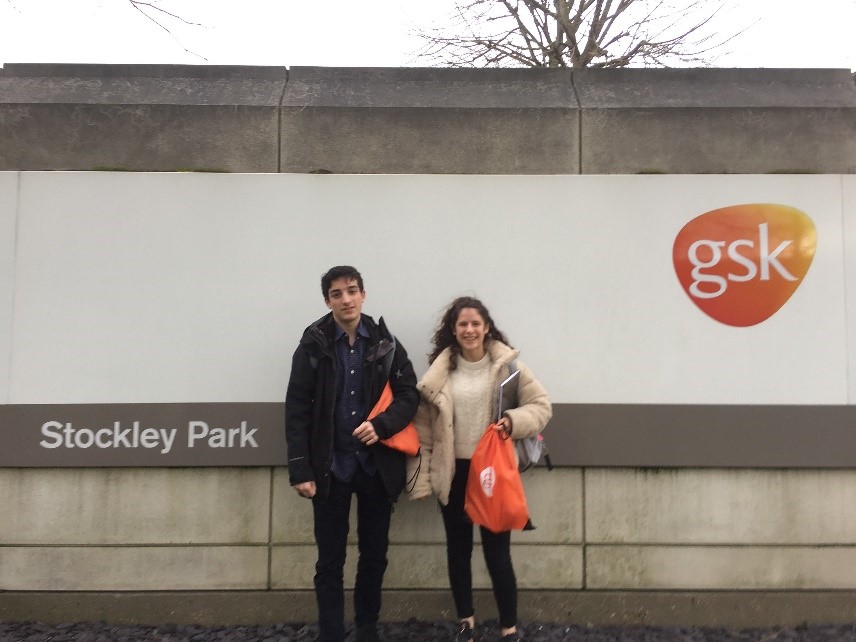
Joel and myself posing outside of GSK Stockley Park
On Thursday, the day was mainly centred around advising us on applications and interviews. We were given good and bad applications and we had to specify how to improve each example. Some tips I learned were to do research, always relate back to myself, be realistic, be specific, explain the skills gained from different experiences and show that there is more to me than work. The most valuable advice was only to mention bad experiences if I learned from them and turned them into positives. We also covered key interview questions such as our greatest weakness, where you must also turn the negative into a positive. The most appreciated part of the insight week was our practice interviews where I was given the opportunity to make mistakes and hear feedback from commonly asked questions. I was also able to hear other people answering these questions which taught me some of their skills. One key feedback I received was to slow down and think about the question. Another activity was seeing how virtual reality has helped in the Pharmaceutical Industry. It is very useful for changing the layout of shops, such as Superdrug, in order to suit the customer, for example doing some research into what shelf the product should be on or even the colour of the product. This was a fun activity because we were able to use the headsets and compare the different layouts, evaluating which set was most suitable. The final session of the day was based on branding and marketing in relation to loyalty and relationship with a brand. The 4 key factors to be considered are product, place, price and promotion. The packaging must be clearly written in simple English so that all consumers can understand the instructions and take safety precautions.
On the last day, we put all of our knowledge or drug development into use where we were split up into teams to plan our own product. We had to consider all the factors we had learned throughout the week including Drug discovery, Clinical testing, Statistics and Branding. Our task was to develop a drug for children. From this cue, we planned a medicine that fights the symptoms and the infection for tonsillitis. We had to think about the side effects of the drug in order to maintain quality customer care. This involved weighing up the job of fighting tonsillitis versus the likelihood of drowsiness. We also decided to have a child lock lid and a syringe in order to make it as child-friendly possible and to ensure that the medicine goes directly to the back of the throat. Creating this product improved our communication and teamwork skills, while reflecting on the week. We had to present our product peers and GSK staff where we spoke clearly with confidence in order to sell our product. I really enjoyed this dragons den activity as it allowed me to get even closer with my peers and learned about how to apply my knowledge. I am extremely grateful for the opportunity and I was very pleased that I graduated as an Industrial Cadet (Silver level)3. I would strongly recommend Yavneh College students to take up future opportunities because of the fun in working at GSK and the exciting career opportunities. What an amazing week I had at GSK!
Notes:
1This experience at GSK took place just before the pandemic in 2020.
2GSK is a science-led global healthcare company with a special purpose: to help people do more, feel better, live longer. GSK has three global businesses that research, develop and manufacture innovative pharmaceutical medicines, vaccines and consumer healthcare products. In 2020, GSK had a group turnover of £34.1 billion with a total operating profit of £7.8 billion. https://www.gsk.com/en-gb/home/.
3EDT (Engineering Development Trust) is a charity that delivers over 40,000 experiences each year to encourage young people to have an interest in Science, Technology, Engineering and Mathematics. It runs Industrial Cadets, an industry-led accreditation that allows employers to run accredited work experience for young people.
The author of this piece, Jessie Hakkak, joined Yavneh College in 2014. As well as an exemplary academic record, Jessie has volunteered for a variety of charities and supported the College in a variety of causes. In her spare time, she likes to knit and take care of her pet dog.
Edited by Dr. A. Ramlogan, Mathematics Department, Yavneh College
